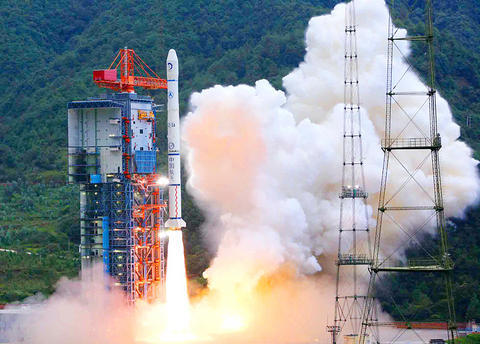Asia's space race heated up yesterday as China launched its first lunar orbiter, an event hailed in the world's most populous country as a milestone event in its global rise.
China's year-long expedition, costing 1.4 billion yuan (US$184 million), kicked off a program that aims to land an unmanned rover on the moon's surface by 2012 and put a man on the moon by about 2020.
The launch of Chang'e I, which will explore and map the moon's surface, came after Japan last month launched its first lunar probe and ahead of a similar mission planned by India for next year.

PHOTO: REUTERS
Chang'e I took off at 6:05pm -- perfect timing for a national TV audience that watched it live after repeatedly being told by the government-controlled press about the significance of the event.
China has hailed the lunar orbiter as the third major milestone event for the nation's space program, after developing rockets and satellites since the 1970s and sending men into orbit in 2003 and 2005.
"Flying to the moon is the nation's long cherished dream," Xinhua news agency said in a report immediately after the launch.
More than 1,000 Chinese journalists had reportedly converged on Xichang Satellite Launching Center in Sichuan Province to cover the event.
In the months leading up to the launch, one of the chief scientists in China's moon program, Ouyang Ziyuan (歐陽自遠), also pointed to the broader message a successful mission would send to the Chinese people and the world.
"As lunar exploration embodies our overall national strength, it is very significant for raising our international prestige and our national unity," Ouyang told the People's Daily.
To drum up Chinese pride, the national anthem and 31 other patriotic songs were uploaded onto the satellite so it could broadcast the music back to China.
On Sept. 14, Japan stole a march on China by launching its first lunar orbiter as a key step in putting a man on the moon by 2020.
Although the timeframes for China and Japan to eventually put someone on the moon are roughly similar, Chinese officials tried to play down the rivalry.
"Japan began its lunar exploration research much earlier than we did, so we have always stressed that with the launch of Chang'e I, we don't want to be talking about who is first," top mission official Zhang Jianqi (桲建琪) said.

MORE VISITORS: The Tourism Administration said that it is seeing positive prospects in its efforts to expand the tourism market in North America and Europe Taiwan has been ranked as the cheapest place in the world to travel to this year, based on a list recommended by NerdWallet. The San Francisco-based personal finance company said that Taiwan topped the list of 16 nations it chose for budget travelers because US tourists do not need visas and travelers can easily have a good meal for less than US$10. A bus ride in Taipei costs just under US$0.50, while subway rides start at US$0.60, the firm said, adding that public transportation in Taiwan is easy to navigate. The firm also called Taiwan a “food lover’s paradise,” citing inexpensive breakfast stalls

TRADE: A mandatory declaration of origin for manufactured goods bound for the US is to take effect on May 7 to block China from exploiting Taiwan’s trade channels All products manufactured in Taiwan and exported to the US must include a signed declaration of origin starting on May 7, the Bureau of Foreign Trade announced yesterday. US President Donald Trump on April 2 imposed a 32 percent tariff on imports from Taiwan, but one week later announced a 90-day pause on its implementation. However, a universal 10 percent tariff was immediately applied to most imports from around the world. On April 12, the Trump administration further exempted computers, smartphones and semiconductors from the new tariffs. In response, President William Lai’s (賴清德) administration has introduced a series of countermeasures to support affected

CROSS-STRAIT: The vast majority of Taiwanese support maintaining the ‘status quo,’ while concern is rising about Beijing’s influence operations More than eight out of 10 Taiwanese reject Beijing’s “one country, two systems” framework for cross-strait relations, according to a survey released by the Mainland Affairs Council (MAC) on Thursday. The MAC’s latest quarterly survey found that 84.4 percent of respondents opposed Beijing’s “one country, two systems” formula for handling cross-strait relations — a figure consistent with past polling. Over the past three years, opposition to the framework has remained high, ranging from a low of 83.6 percent in April 2023 to a peak of 89.6 percent in April last year. In the most recent poll, 82.5 percent also rejected China’s

PLUGGING HOLES: The amendments would bring the legislation in line with systems found in other countries such as Japan and the US, Legislator Chen Kuan-ting said Democratic Progressive Party (DPP) Legislator Chen Kuan-ting (陳冠廷) has proposed amending national security legislation amid a spate of espionage cases. Potential gaps in security vetting procedures for personnel with access to sensitive information prompted him to propose the amendments, which would introduce changes to Article 14 of the Classified National Security Information Protection Act (國家機密保護法), Chen said yesterday. The proposal, which aims to enhance interagency vetting procedures and reduce the risk of classified information leaks, would establish a comprehensive security clearance system in Taiwan, he said. The amendment would require character and loyalty checks for civil servants and intelligence personnel prior to